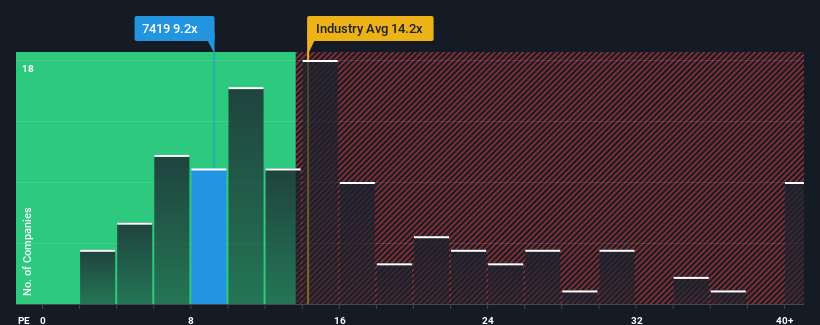- Japan
- /
- Specialty Stores
- /
- TSE:7419
Nojima Corporation's (TSE:7419) Shares Leap 32% Yet They're Still Not Telling The Full Story

The Nojima Corporation (TSE:7419) share price has done very well over the last month, posting an excellent gain of 32%. The last 30 days bring the annual gain to a very sharp 76%.
Even after such a large jump in price, Nojima's price-to-earnings (or "P/E") ratio of 9.2x might still make it look like a buy right now compared to the market in Japan, where around half of the companies have P/E ratios above 14x and even P/E's above 21x are quite common. Although, it's not wise to just take the P/E at face value as there may be an explanation why it's limited.
We've discovered 1 warning sign about Nojima. View them for free.Nojima certainly has been doing a great job lately as it's been growing earnings at a really rapid pace. One possibility is that the P/E is low because investors think this strong earnings growth might actually underperform the broader market in the near future. If you like the company, you'd be hoping this isn't the case so that you could potentially pick up some stock while it's out of favour.
See our latest analysis for Nojima

What Are Growth Metrics Telling Us About The Low P/E?
There's an inherent assumption that a company should underperform the market for P/E ratios like Nojima's to be considered reasonable.
Taking a look back first, we see that the company grew earnings per share by an impressive 64% last year. EPS has also lifted 30% in aggregate from three years ago, mostly thanks to the last 12 months of growth. Therefore, it's fair to say the earnings growth recently has been respectable for the company.
Comparing that to the market, which is predicted to deliver 9.7% growth in the next 12 months, the company's momentum is pretty similar based on recent medium-term annualised earnings results.
With this information, we find it odd that Nojima is trading at a P/E lower than the market. Apparently some shareholders are more bearish than recent times would indicate and have been accepting lower selling prices.
What We Can Learn From Nojima's P/E?
Nojima's stock might have been given a solid boost, but its P/E certainly hasn't reached any great heights. We'd say the price-to-earnings ratio's power isn't primarily as a valuation instrument but rather to gauge current investor sentiment and future expectations.
Our examination of Nojima revealed its three-year earnings trends aren't contributing to its P/E as much as we would have predicted, given they look similar to current market expectations. When we see average earnings with market-like growth, we assume potential risks are what might be placing pressure on the P/E ratio. At least the risk of a price drop looks to be subdued if recent medium-term earnings trends continue, but investors seem to think future earnings could see some volatility.
Plus, you should also learn about this 1 warning sign we've spotted with Nojima.
If you're unsure about the strength of Nojima's business, why not explore our interactive list of stocks with solid business fundamentals for some other companies you may have missed.
Valuation is complex, but we're here to simplify it.
Discover if Nojima might be undervalued or overvalued with our detailed analysis, featuring fair value estimates, potential risks, dividends, insider trades, and its financial condition.
Access Free AnalysisHave feedback on this article? Concerned about the content? Get in touch with us directly. Alternatively, email editorial-team (at) simplywallst.com.
This article by Simply Wall St is general in nature. We provide commentary based on historical data and analyst forecasts only using an unbiased methodology and our articles are not intended to be financial advice. It does not constitute a recommendation to buy or sell any stock, and does not take account of your objectives, or your financial situation. We aim to bring you long-term focused analysis driven by fundamental data. Note that our analysis may not factor in the latest price-sensitive company announcements or qualitative material. Simply Wall St has no position in any stocks mentioned.
About TSE:7419
Nojima
Operates digital home electronics retail stores in Japan and internationally.
Flawless balance sheet, good value and pays a dividend.
Market Insights
Community Narratives



